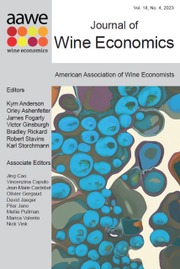Crossref Citations
This article has been cited by the following publications. This list is generated based on data provided by
Crossref.
Borges, José
Real, António C.
Sarsfield Cabral, J.
and
Jones, Gregory V.
2012.
Condorcet versus Borda, a response to: Comment on “A New Method to Obtain a Consensus Ranking of a Region's Vintages' Quality”.
Journal of Wine Economics,
Vol. 7,
Issue. 2,
p.
245.
Salinger, Michael James
Baldi, Marina
Grifoni, Daniele
Jones, Greg
Bartolini, Giorgio
Cecchi, Stefano
Messeri, Gianni
Dalla Marta, Anna
Orlandini, Simone
Dalu, Giovanni A.
and
Maracchi, Gianpiero
2015.
Seasonal differences in climate in the Chianti region of Tuscany and the relationship to vintage wine quality.
International Journal of Biometeorology,
Vol. 59,
Issue. 12,
p.
1799.
Bodington, Jeffrey
and
Malfeito-Ferreira, Manuel
2019.
Should Ties Be Broken in Commercial Wine Competitions? When Yes, What Method Is Practical and Defensible?.
Journal of Wine Economics,
Vol. 14,
Issue. 3,
p.
298.
Krishnan, Anath Rau
Hamid, Mohamad Rizal
Tanakinjal, Geoffrey Harvey
Asli, Mohammad Fadhli
Boniface, Bonaventure
and
Ghazali, Mohd Fahmi
2023.
An investigation to offer conclusive recommendations on suitable benefit/cost criteria-based normalization methods for TOPSIS.
MethodsX,
Vol. 10,
Issue. ,
p.
102227.
Atmaca, Ediz
Aktaş, Esra
and
Öztürk, Hafsa Nur
2023.
Evaluated Post-Disaster and Emergency Assembly Areas Using Multi-Criteria Decision-Making Techniques: A Case Study of Turkey.
Sustainability,
Vol. 15,
Issue. 10,
p.
8350.




